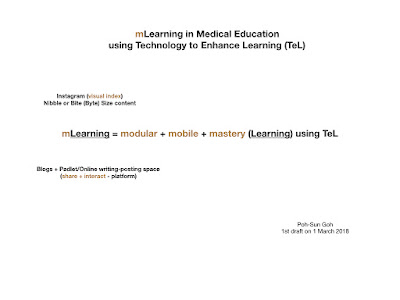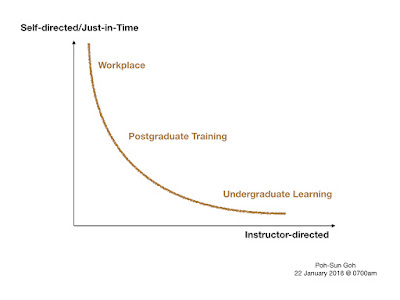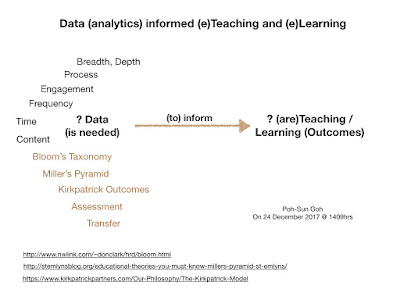Workshop program
Technology enhanced learning
Start Time: 9.00am (onsite registration starting 8.30am)
Introduction, review of basic concepts, pre-reading, practical guide and pre-workshop assignment (see message below)
Morning tea: 10.30am to 11.00am
Tools related (below)
Participants developing own teaching blog, OR hyperlinked (illustrated-multimedia augmented) note-word document for posting on Padlet, discussion
Lunch 1230pm to 13.30pm
Approach related (below)
Flipped classroom in medical education
Afternoon tea: 3pm to 3.30pm
End Time: 5pm
(Note highlighted words are linked to online resources for pre-reading, review, reflection, perspective, points-of-view, including regional, some older, general, overview papers, and for reference. You might want to start your workshop preparation by reading a practical guide.
Recommend workshop participants allocate 3 to 4 hours for pre-workshop preparation, and skim through the pre-reading material, which have been presented buffet style as hyperlinked resources to EACH highlighted word above. Please use this to BUILD up a FOUNDATION of KEY IDEAS and CONCEPTS.
As one learning path, please consider first WHY before HOW (why you might want to use Technology to Enhance Learning). Then, make notes on the TAXONOMY or FRAMEWORK of eLearning or Technology Enhanced Learning (TEL) - METHODS and TOOLS to give you a feel of the WHOLE SPECTRUM and BREADTH of eLearning or TEL; before selecting a few methods or tools that you might find useful, and reflect on how these might assist you in your teaching and training practice; and finally think about how certain pedagogical approaches and instructional design frameworks like the Flipped Classroom and ADDIE might help you utilise Technology to Enhanced Learning. We will work on developing an individual approach, and implementation plan during the workshop.)
________________________
Message to the workshop participants from the workshop faculty:
Please sign up for a Google Blogger account before coming to the workshop (the websites below show you how to do this), and bring along a copy of a PowerPoint presentation you have recently given, or intend to give, as well as the individual slides of this PowerPoint presentation exported as individual JPEG images loaded onto a folder accessible by the tablet or laptop you bring along with you to the workshop. All the slides in the PowerPoint presentation should be ready to be shared on the internet, i.e. the content should have been created by you, you own the copyright or have permission to use the content, you have correctly attributed the source of content you are referring to, and the content should comply with local regulations regarding privacy and confidentiality, and intellectual property use/attribution.
Start your Google blog before coming to the workshop (follow the "how to" instructions from Google and other websites below), and upload the JPEG images of your presentation onto your blog.
Also, please link you Google Blogger account with a Google Analytics account (see section below) before the workshop. This will allow us to have an interactive discussion with the workshop participants on the following topics -
- What's Google Analytics
- Benefits of Google Analytics
- Metrics and Dimensions in Google Analytics
- How can we apply this knowledge in practice
- Other advice to improve your blog experience
You can continue to work on and refine your blog during and after the workshop.
Starting before, during, and soon after the workshop, we invite participants to share some information about who they are, their educational background, current teaching setting, how they hope to use technology to enhance their teaching, key messages they took away from the workshop (including from their pre-reading and pre-workshop preparation and preliminary steps starting their teaching blog), as well share the link of their draft teaching blog - all of this as a post on the online "Padlet" wall below, embedded within this workshop blog (Padlet is an interactive digital wall, which is on a private space on Padlet.com, and is not searchable on Google - you are able to write, edit and delete your own posts, without needing to login (by just double clicking or double tapping on the Padlet wall, or clicking the circled red + button bottom right of the Padlet wall), as long as you use the same mobile or desktop device; even though this platform works with all mobile and desktop devices, you will probably find using a laptop/workstation or tablet the easiest way to write and edit your posts on this website. You might also op to use initials, and omit specifying your institutional affiliation, in order to further anonymise your Padlet posts, as this workshop blog is available for open access).
Please start a post on the Padlet wall within the blog before the workshop. You can refine this during and after the workshop on the same post, as long as you use the same device.
Sharing your background, and teaching site will enable us to potentially continue to have an online discussion after the workshop on the Padlet wall. You can write, and edit your post on the Padlet wall by double tapping or double clicking on the space; or by going directly to the link below the Padlet wall. As long as you use the same device, you can continue to add to, edit or delete your post at any time. I have organised the flow of the posted messages on the Padlet wall so that the latest post is always at the top. This will enable you to find earlier messages and posts.
We encourage you to actively participate in the workshop, by undertaking the pre-workshop preparation, and workshop activities. What we take away from any educational activity - key ideas that we make a note of, and new things we are able to do - are arguably the most valuable outcomes of any educational and training session.
Please also complete the short email survey (by replying INDIVIDUALLY to our email to you) at least ONE WEEK before the workshop, to give us an idea of your teaching background and what you hope to get out of the workshop. This will enable us to customise the workshop to your educational needs."
Thank you.
From your workshop faculty/facilitators,
________________________
and
Explore the Google Analytics blog and Google Analytics YouTube Channel
Please review the online resources above before the workshop. This should take approximately 3 to 4 hours. You can also browse - skim through the material below. I will be presenting exclusively - entirely from this material.
Lastly, please bring your personal WiFi/3G/4G enabled tablet or laptop to the workshop. You should have examples of your teaching content on the tablet or laptop. You will be using this tablet or laptop for the session and workshop activities.
When you arrive at the workshop, please log in to the Wi-Fi network and the workshop presentation blog on your mobile device-tablet-laptop.
https://telatcenmed.blogspot.sg/2018/03/technology-enhanced-learning-elearning.html
Thank you.
______________________________________
__________________________________________
above from
Goh, P.S. eLearning in Medical Education - Costs and Value Add. The Asia Pacific Scholar (TAPS). Published online: 2 May, TAPS 2018, 3(2), 58-60. DOI: https://doi.org/10.29060/TAPS.2018-3-2/PV1073
The great intellectual property trade-off By Tim Harford BBC World Service, 50 Things That Made the Modern Economy (26 June 2017)
Goh, P.S. Technology enhanced learning in Medical Education: What’s new, what’s useful, and some important considerations. MedEdPublish. 2016 Oct; 5(3), Paper No:16. Epub 2016 Oct 12.
Everything I have learnt about eLearning from Poh-Sun Goh
https://www.td.org/insights/how-long-does-it-take-to-develop-one-hour-of-training-updated-for-2017
https://www.td.org/newsletters/learning-circuits/time-to-develop-one-hour-of-training-2009
https://www.td.org/insights/how-long-does-it-take-to-develop-one-hour-of-training-updated-for-2017
https://www.td.org/insights/how-long-does-it-take-to-develop-one-hour-of-training-updated-for-2017
https://www.td.org/newsletters/learning-circuits/time-to-develop-one-hour-of-training-2009
above from
above from
and
above from
above from
click on tile above
--------------
above from
Goh, P.S. Learning Analytics in Medical Education. MedEdPublish. 2017 Apr; 6(2), Paper No:5. Epub 2017 Apr 4 https://doi.org/10.15694/mep.2017.000067
“Above image reproduced by permission of the publisher, © 2012 by tpack.org”
3 take home points
1. focus on your teaching and learning objectives, not the technology ... (e)Learning (small "e", big "L"... focus on the Learning) ... focus on understanding learning needs, curricula design, scaffolding, learner support and customised learning, assessment with feedback and evaluate what you are doing ... document and make transparent your process
2. use "simple" tech - email, SMS, blogs (websites) to broadcast, and "narrowcast" .. targeted message ... connect ... disseminate ... document
3. keep refining your teaching techniques, and improving as an educator (Glassick's criteria - clear goals, adequate preparation, appropriate methods, significant results, effective presentation, AND reflective critique ..... Glassick, C.E., Huber, M.R. & Maeroff, G.I. (1997). Scholarship Assessed - Evaluation of the Professiorate. San Francisco, CA: Jossey-Bass).
(see embedded video within website above)





























































No comments:
Post a Comment
Note: Only a member of this blog may post a comment.